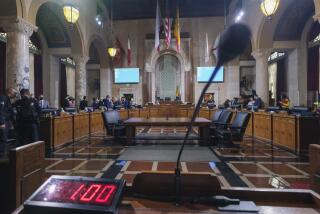Hong Kong Proposes New Method for Electing Lawmakers
- Share via
HONG KONG — The new government here has unveiled a plan for next year’s legislative elections that is expected to favor business groups and dilute the power of Hong Kong’s most popular party, the Democrats.
The government said Tuesday that 20 of 60 legislative seats will be selected by proportional representation, a method that gives seats to parties according to the proportion of ballots each receives, similar to systems used in Germany and Ireland.
Of the remaining seats, 30 will be selected by professional groups called functional constituencies and 10 will be chosen by an electoral college.
“There is no such thing as the perfect electoral system,” said Nicholas Ng, secretary for constitutional affairs, at a news conference Tuesday, adding that Hong Kong is headed gradually toward universal suffrage.
“In every system, there might be advantages or disadvantages and special features that fit the climate of the place or the country. But ultimately, it must be perceived to be generally fair and generally open,” he said.
Under the new system, pro-democracy parties are not expected to repeat their strong performance in the 1995 elections, in which they took 32 of 60 seats.
As in the past, a small group of industrial and political leaders will be allowed a second vote to choose representatives of their professions. The so-called functional constituencies reflect what the government considers their greater contributions to society. Hong Kong’s last British governor, Chris Patten, expanded those professional groups to allow nearly all working people a second vote, but the new government plans to narrow the number of professionals eligible to vote twice.
Martin Lee, the Democrats’ chairman, condemned the plans as “designed to thwart the public will by giving seats to those who lost in past elections,” he said. “This represents the beginning of the ‘Singaporization’ of Hong Kong, where there are so-called ‘elections’--but the results are always what the government wants.”
Lee said he expects the pro-democracy bloc to drop from 32 seats to 12.
Emily Lau, the outspoken leader of the pro-democracy Frontier Party, will be ineligible to be a candidate for one of the proportionally allotted seats because she holds a British passport. The new rules allow 12 members to hold foreign passports, but only those selected from the professional groups.
“It’s utterly disgraceful,” said Lau, who believes the entire council should be directly elected. “They are limiting the franchise to a small group of powerful people.”
Lau and the other members of her party with a foreign passport would consider giving them up in order to be candidates, she said.
*
Lee and Lau are two of 27 members of Hong Kong’s former, elected Legislative Council who lost their seats July 1, when China took over and Hong Kong’s new government dissolved the body and replaced it with an appointed council. The proposed election law will be submitted July 23 to the new assembly, known as the Provisional Legislature.
While members of the new government acknowledged that a shift in power may be the ultimate effect of the new election plan, they denied that it intentionally targets the Democrats.
Chinese University professor Lau Siu-kai, the head of a Beijing-backed subcommittee that originally recommended the system, said, “In fact, its objective is to prevent political parties from winning” too much influence in the government.
The new arrangements will also give greater voice to smaller parties and independent candidates, as well as to “the silent majority,” said Anthony Leung, a member of Chief Executive Tung Chee-hwa’s Cabinet and the managing director of Chase Manhattan Bank here.
“In Hong Kong . . . the people who vote are people who are interested in politics. So the people who vote are actually a minority, and the people who win aren’t necessarily representative,” Leung said.
As the fledgling government completes its election plan, it also must decide whether the current Provisional Legislature is legal. Because Hong Kong’s new constitution requires that the legislature be elected, legal experts have challenged the appointed body’s right to pass laws.
A hearing to decide the council’s legitimacy is scheduled for July 29 in Hong Kong’s Court of Appeal.
More to Read
Sign up for Essential California
The most important California stories and recommendations in your inbox every morning.
You may occasionally receive promotional content from the Los Angeles Times.













